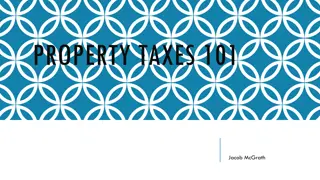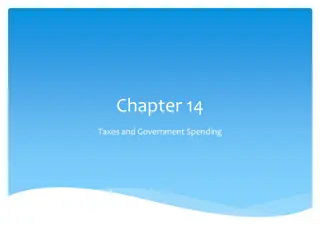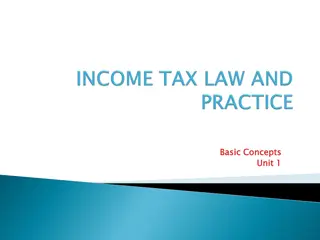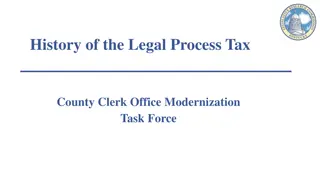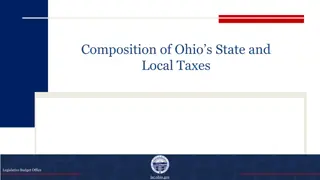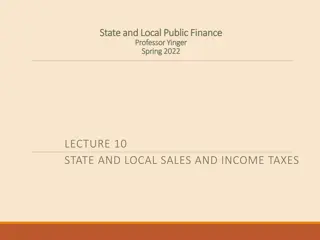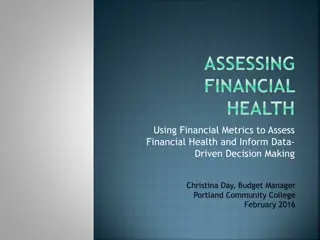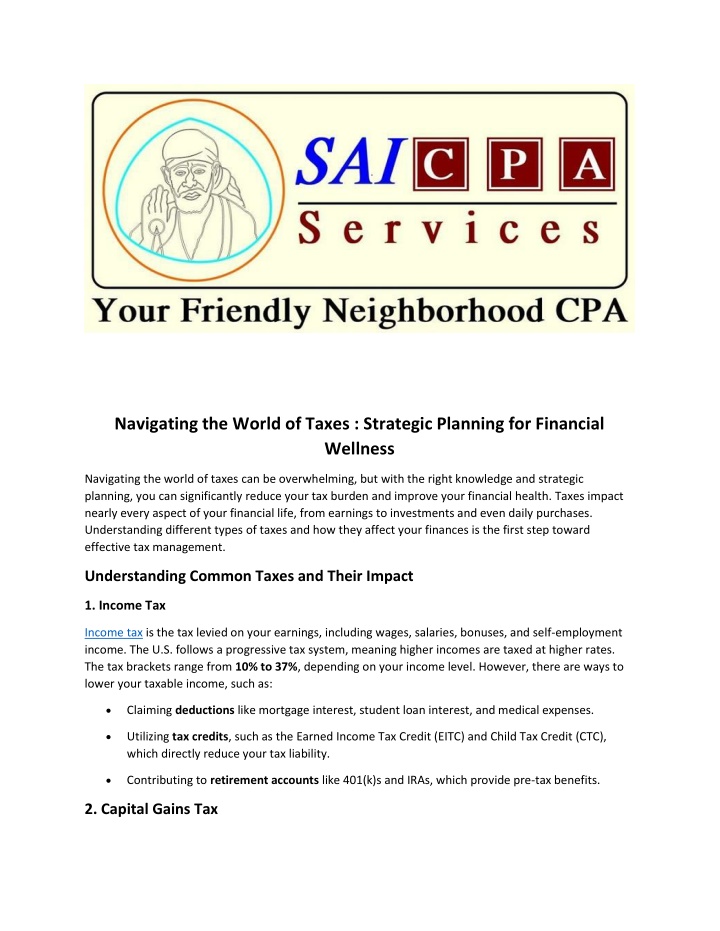
Navigating the World of Taxes : Strategic Planning for Financial Wellness
Navigating the world of taxes can be overwhelming, but with the right knowledge and strategic planning, you can significantly reduce your tax burden and improve your financial health.
Uploaded on | 3 Views
Download Presentation

Please find below an Image/Link to download the presentation.
The content on the website is provided AS IS for your information and personal use only. It may not be sold, licensed, or shared on other websites without obtaining consent from the author. If you encounter any issues during the download, it is possible that the publisher has removed the file from their server.
You are allowed to download the files provided on this website for personal or commercial use, subject to the condition that they are used lawfully. All files are the property of their respective owners.
The content on the website is provided AS IS for your information and personal use only. It may not be sold, licensed, or shared on other websites without obtaining consent from the author.
E N D
Presentation Transcript
Navigating the World of Taxes : Strategic Planning for Financial Wellness Navigating the world of taxes can be overwhelming, but with the right knowledge and strategic planning, you can significantly reduce your tax burden and improve your financial health. Taxes impact nearly every aspect of your financial life, from earnings to investments and even daily purchases. Understanding different types of taxes and how they affect your finances is the first step toward effective tax management. Understanding Common Taxes and Their Impact 1. Income Tax Income tax is the tax levied on your earnings, including wages, salaries, bonuses, and self-employment income. The U.S. follows a progressive tax system, meaning higher incomes are taxed at higher rates. The tax brackets range from 10% to 37%, depending on your income level. However, there are ways to lower your taxable income, such as: Claiming deductions like mortgage interest, student loan interest, and medical expenses. Utilizing tax credits, such as the Earned Income Tax Credit (EITC) and Child Tax Credit (CTC), which directly reduce your tax liability. Contributing to retirement accounts like 401(k)s and IRAs, which provide pre-tax benefits. 2. Capital Gains Tax
Capital gains tax applies to profits from the sale of assets like stocks, real estate, and collectibles. The rate depends on the duration you hold the asset: Short-term capital gains (held for less than a year): Taxed as ordinary income (10% to 37%). Long-term capital gains (held for more than a year): Taxed at lower rates of 0%, 15%, or 20%, depending on income. Strategic tax planning can help reduce capital gains tax by holding assets longer to qualify for lower rates and utilizing tax-loss harvesting to offset gains with losses. 3. Property Tax Property tax is a local tax levied on real estate properties and is used to fund essential services like schools, roads, and emergency services. It varies widely by location but can range from 5% to 10% of household income. Factors affecting property tax include: The market value of your property. Local tax rates set by municipalities. Exemptions or deductions for veterans, seniors, or low-income homeowners. 4. Sales Tax Sales tax is a consumption-based tax applied to goods and services at the point of sale. The rate differs by state and locality, with some states charging no sales tax at all. For example, New Jersey has a sales tax rate of 6.625%. Sales tax impacts purchasing power, so it s essential to consider tax-free shopping periods, rebates, or exemptions on necessary items. 5. Social Security & Medicare Taxes (FICA Taxes) These mandatory payroll taxes fund the Social Security and Medicare programs, which provide financial support for retirees and healthcare for seniors. Employees and employers each pay 7.65% (6.2% for Social Security and 1.45% for Medicare), with self-employed individuals covering both portions (15.3%). High earners may face an additional 0.9% Medicare surtax on income exceeding certain thresholds. Strategic Tax Planning Tips Considering the cumulative effect of these taxes, some individuals may pay over 60% of their income in taxes. However, strategic planning can help reduce this burden. Here are some effective tax-saving strategies: 1. Convert Short-Term Gains to Long-Term Gains Short-term capital gains are taxed at higher rates than long-term gains. If possible, hold onto investments for over a year to benefit from lower tax rates. 2. Maximize Retirement Contributions
Contributing to retirement accounts like 401(k)s, IRAs, and Health Savings Accounts (HSAs) can reduce taxable income while securing future financial stability. 401(k) contribution limits (2024): $23,000 ($30,500 for those 50+). IRA contribution limits (2024): $7,000 ($8,000 for those 50+). HSA contribution limits (2024): $4,150 (individual) or $8,300 (family). 3. Utilize Tax-Advantaged Investments Investing in tax-efficient assets like municipal bonds, Roth IRAs, and index funds can help minimize tax liabilities. 4. Consider Qualified Dividends Qualified dividends are taxed at long-term capital gains rates, which are lower than ordinary income tax rates. Holding dividend-paying stocks for the required period ensures lower taxation. 5. Shift Income to Lower Tax Brackets Income splitting: Distributing income among family members in lower tax brackets can help reduce overall tax liability. Tax deferral: Deferring income to future years (if expecting a lower tax rate) can help save on taxes. Why Consult a Tax Professional? While these strategies provide a solid foundation, tax planning is highly personalized. A Certified Public Accountant (CPA) or tax advisor can help tailor strategies based on your specific financial situation, ensuring compliance and maximizing savings. ?Disclaimer: This blog is for informational purposes only and does not constitute legal or tax advice. Always consult a tax professional before making financial decisions. By taking a proactive approach to tax planning, you can reduce your tax burden, maximize savings, and achieve greater financial wellness. Start strategizing today!




